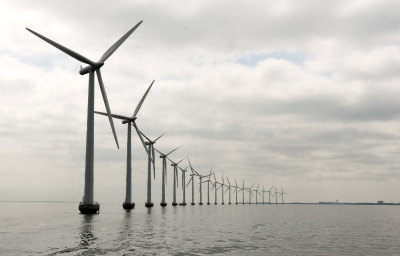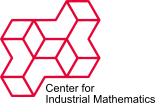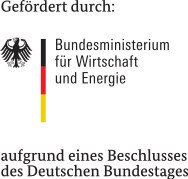HVDC-MMC_with_MPC: A new method for reducing the power dissipation of MMC high-voltage converters using MPC
| Working Group: | WG Optimization and Optimal Control |
| Leadership: | Prof. Dr. Christof Büskens ((0421) 218-63861, E-Mail: bueskens@math.uni-bremen.de ) |
| Processor: | Dr. Chathura Wanigasekara |
| Funding: | Bundesministerium für Wirtschaft und Energie (BMWi) |
| Project partner: |
Institut für Automatisierungstechnik (IAT), Universität Bremen Siemens AG |
| Time period: | 01.07.2020 - 30.06.2023 |
 In order to make the best possible use of renewable energies, renewable energy generation plants must be built where the corresponding form of energy is available in sufficient quantities. Offshore wind farms in the north of Germany in particular are far away from energy-intensive industries in central and southern Germany. As a result, there is an increasing need to transport large amounts of electrical energy over long distances. This can be achieved with particularly low losses and underground in the form of submarine and underground cables using transmission lines that operate with high-voltage direct current (HVDC). This technology in turn requires the use of high voltage inverters that can convert direct current into alternating current (and vice versa) at high voltage levels. The aim of the project is to improve the efficiency of high-voltage direct current transmission by using optimal control algorithms in high-voltage converters.
In order to make the best possible use of renewable energies, renewable energy generation plants must be built where the corresponding form of energy is available in sufficient quantities. Offshore wind farms in the north of Germany in particular are far away from energy-intensive industries in central and southern Germany. As a result, there is an increasing need to transport large amounts of electrical energy over long distances. This can be achieved with particularly low losses and underground in the form of submarine and underground cables using transmission lines that operate with high-voltage direct current (HVDC). This technology in turn requires the use of high voltage inverters that can convert direct current into alternating current (and vice versa) at high voltage levels. The aim of the project is to improve the efficiency of high-voltage direct current transmission by using optimal control algorithms in high-voltage converters. The research project focuses on the development, implementation and testing of a powerful and real-time capable non-linear model predictive control (NMPC) for the control of a modular high voltage inverter (HVDC-MMC). An NMPC controller has internally a simplified complete model of the process dynamics, which is used to predict the future course of the process variables over a limited period of time. For a given cost functional, a numerical optimization procedure can be used to determine the optimal mode of operation over the considered future time horizon. However, only the first step is transferred to the process. In the next sampling step, the considered time period is shifted and the entire calculation is performed again. By this procedure new measured values are included in each time step and thus not measured disturbances and deviations between process model and real process behaviour are considered.
Since the solution of the optimization problem requires calculation time in each step, dealing with limitations of calculation time and capacity is a challenge when implementing MPC methods in highly dynamic real-time applications. For this purpose, a completely new approach, tailored to the characteristic technological properties of converters, is to be pursued. This approach will make it possible to overcome the computation time problem despite the necessary high-frequency switching operations and to use the advantages of MPC processes for minimizing losses in extra-high voltage converters.
Translated with www.DeepL.com/Translator (free version)
Image: „Middelgruden Offshore Wind Farm in Denmark“ by United Nations Photo, licenced under CC BY-NC-ND 2.0 (https://creativecommons.org/licenses/by-nc-nd/2.0/)


